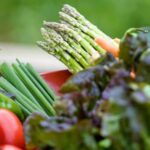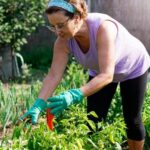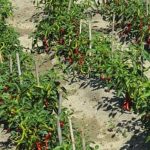Albuquerque, known for its vibrant culture and breathtaking landscapes, also harbors a thriving community of vegetable gardeners. With its unique climate and arid conditions, Albuquerque presents both challenges and opportunities for those looking to cultivate their own fresh produce. In this article, we will delve into the world of Albuquerque vegetable gardening, exploring the techniques, tips, and tricks necessary to successfully grow vegetables in this desert-like environment.
Vegetable gardening in Albuquerque requires an understanding of the city’s distinctive climate. Hot summers with scorching temperatures and low humidity can pose challenges to plant growth, while mild winters provide their own set of considerations. By understanding these conditions and preparing accordingly, gardeners can create the perfect growing environment for their vegetables.
One crucial aspect of successful Albuquerque vegetable gardening is choosing the right soil and creating ideal growing conditions. The arid climate necessitates specific soil amendments to enhance water retention and nutrient availability. Additionally, creating shade structures or employing mulching techniques can help mitigate the intense sun exposure that can damage plants.
As we embark on this exploration of Albuquerque vegetable gardening, be prepared to discover expert tips from local gardeners who have mastered the art of cultivating vegetables in this unique environment. From watering techniques that conserve resources to selecting varieties specifically adapted to the arid climate, these tips will prove invaluable in achieving a bountiful harvest.
So join us as we unlock the secrets of Albuquerque vegetable gardening – a world where perseverance meets creativity, where vibrant flavors come alive from your backyard plot. Get ready to immerse yourself in a world of fresh produce grown right in the heart of New Mexico’s desert landscape.
Understanding the Unique Challenges of Vegetable Gardening in the Albuquerque Climate
The Arid Climate of Albuquerque
One of the unique challenges that gardeners in Albuquerque face is the arid climate. The city experiences hot and dry summers, with average temperatures reaching over 90 degrees Fahrenheit. This extreme heat can put stress on vegetable plants and make it difficult for them to thrive. Additionally, Albuquerque receives very little rainfall throughout the year, making irrigation a crucial aspect of successful vegetable gardening.
Limited Growing Season
Another challenge that vegetable gardeners in Albuquerque encounter is the limited growing season. Due to its high elevation of around 5,000 feet above sea level, Albuquerque experiences short springs and falls. Frosts can occur as early as October and as late as April, which significantly narrows the window for growing vegetables outdoors.
Managing Temperature Variations
The temperature variations in Albuquerque can also present challenges for vegetable gardening. While summers are scorching hot, winters can bring freezing temperatures and occasional snowfall. These rapid shifts in temperature require gardeners to be vigilant about protecting their plants during cold snaps by using frost blankets or cloches.
Despite these challenges, it is still possible to have a thriving vegetable garden in Albuquerque by understanding and adapting to the unique climate conditions of the region. By implementing certain strategies and selecting specific vegetables suited to this arid environment, gardeners can overcome these challenges and enjoy a bountiful harvest.
Necessary Preparations
Planting a successful vegetable garden in Albuquerque requires taking necessary preparations, including choosing the right soil and creating ideal growing conditions. The arid climate and unique environmental factors of Albuquerque present challenges that gardeners must address to ensure optimal growth and productivity of their vegetables. In this section, we will explore the importance of selecting the right soil type and discuss strategies for creating an ideal growing environment in Albuquerque.
Choosing the Right Soil
One of the first steps in preparing for an Albuquerque vegetable garden is selecting the appropriate soil type. The native soil in Albuquerque is often sandy and lacking in organic matter, which can lead to poor water retention and nutrient deficiencies. To remedy this, it is recommended to amend the soil with organic matter such as compost or well-rotted manure. These amendments help improve soil structure, moisture retention, and nutrient availability.
Another option for gardeners in Albuquerque is raised bed gardening. Raised beds allow for better control over soil quality as they can be filled with a custom blend of topsoil, compost, and other organic materials. This enables gardeners to create an ideal growing medium that suits their specific vegetable crops.
Creating Ideal Growing Conditions
In addition to selecting suitable soil, creating ideal growing conditions is crucial for successful vegetable gardening in Albuquerque. One important factor to consider is irrigation. Due to the arid climate, regular watering is essential to keep plants hydrated and thriving. Drip irrigation systems are particularly effective in conserving water while delivering moisture directly to the roots of plants.
Mulching is another technique that can greatly benefit vegetable gardens in Albuquerque. Applying mulch around plants helps regulate soil temperature, retain moisture, inhibit weed growth, and prevent erosion. Organic mulches such as straw or wood chips are recommended as they also contribute beneficial organic matter as they decompose.
Lastly, providing shade for certain crops can protect them from intense sun exposure during hot summer months. This can be achieved through the use of shade cloths or strategically planting taller crops that provide natural shade for smaller or more delicate plants.
By selecting the right soil and creating ideal growing conditions, gardeners can set their Albuquerque vegetable gardens up for success. These preparations lay the foundation for optimal plant health, growth, and ultimately a bountiful harvest. In the following sections, we will delve into selecting the perfect vegetables for Albuquerque, as well as expert tips and seasonal planting guides to further assist gardeners in their quest for a thriving vegetable garden in Albuquerque’s unique climate.
Selecting the Perfect Vegetables for Your Albuquerque Garden
When it comes to selecting vegetables for your Albuquerque garden, it’s important to choose varieties that are well-suited to the arid climate of the region. By selecting the right vegetables, you can ensure a successful and thriving garden that will yield a bountiful harvest.
One important factor to consider when choosing vegetables for your Albuquerque garden is their water requirements. Since Albuquerque is located in a desert region with limited water resources, it is crucial to select vegetables that are drought-tolerant and require less water. Some examples of drought-tolerant vegetables that thrive in an arid climate include tomatoes, peppers, beans, squash, and melons.
In addition to water requirements, it’s also beneficial to choose vegetables that can tolerate the extreme temperature fluctuations often experienced in Albuquerque. Vegetables like okra, chard, and heat-tolerant varieties of lettuce and spinach are great choices for hot summers, while cool-season crops like broccoli, carrots, and peas can be grown during the mild winters.
| Vegetable | Drought-Tolerance Level | Temperature Tolerance |
|---|---|---|
| Tomatoes | High | Tolerates heat |
| Peppers | High | Tolerates heat |
| Squash (including zucchini) | Moderate to high | Tolerates heat but needs some cooling |
| Beans | Moderate | Tolerates heat but needs moderate temperatures |
| Melons (including cantaloupe) | Low to moderate | Tolerates heat but needs some cooling and protection from extreme temperatures |
Expert Tips for Successful Albuquerque Vegetable Gardening
One of the key factors in successful vegetable gardening in Albuquerque is ensuring proper watering techniques. The arid climate of the region can pose challenges for maintaining adequate moisture levels in the soil. It is important to water deeply and infrequently to encourage deep root growth and prevent water evaporation.
To determine how often to water, it is useful to monitor the moisture level of the soil. Stick your finger about two inches into the ground near the base of your plants. If it feels dry at that depth, it’s time to water. Water slowly and deeply, making sure that the moisture reaches down to the roots. Avoid overhead watering, as it can contribute to fungal diseases.
Mulching is another essential technique for successful vegetable gardening in Albuquerque. A layer of mulch around your plants helps to conserve moisture, regulate soil temperature, suppress weed growth, and improve soil fertility. Organic materials such as straw, wood chips, or compost make excellent mulch options.
Shade techniques also play a crucial role in protecting vegetables from extreme heat during Albuquerque’s hot summers. Providing shade can help reduce stress on plants and prevent them from wilting or suffering sunburn. You can use shade cloth or erect temporary structures like trellises or umbrellas to provide shade during peak sunlight hours.
Implementing these expert tips for watering, mulching, and shading will greatly increase your chances of success in growing vegetables in Albuquerque’s unique climate.
| Expert Tip | Description |
|---|---|
| Deep and Infrequent Watering | Water deeply and infrequently to encourage deep root growth and prevent water evaporation. |
| Monitor Soil Moisture | Check moisture levels by sticking your finger two inches into the ground near the base of plants. |
| Mulching | Apply a layer of organic mulch around plants to conserve moisture, regulate soil temperature, suppress weeds, and improve soil fertility. |
| Shade Techniques | Use shade cloth or temporary structures like trellises or umbrellas to protect vegetables from extreme heat and sunburn. |
Seasonal Planting Guide
When it comes to vegetable gardening in Albuquerque, timing is everything. Understanding the best times to plant and harvest your vegetables can greatly increase your chances of a successful yield. By following a seasonal planting guide, you can ensure that you are maximizing your garden’s potential throughout the year.
Planting Guide for Spring
In Albuquerque, spring is a prime time for planting cool-season crops. These include vegetables such as lettuce, spinach, peas, carrots, and radishes. Start your seeds indoors or purchase transplants from a local nursery around mid-March to early April. Once the danger of frost has passed, typically in late April or early May, you can safely transplant these vegetables into your garden.
Planting Guide for Summer
Summer in Albuquerque can be hot and dry, so it’s important to choose heat-tolerant vegetables for this season. Some good options include tomatoes, peppers, cucumbers, squash, and beans. These warm-season crops should be planted in mid – to late-May after the threat of frost has passed. To protect them from the scorching sun and conserve moisture, consider using shade cloth or mulching around the plants.
Planting Guide for Fall
Fall is another opportunity to extend your growing season in Albuquerque. Cool-season crops such as broccoli, cauliflower, kale, and cabbage thrive during this time of year. Start these seeds indoors around mid-July to early August and transplant them into your garden when temperatures start to cool down in September or early October.
Once you’ve planted your vegetables according to the seasonal planting guide, pay attention to their individual maturity dates for harvesting. Be sure not to let them stay on the vine or in the ground past their prime; otherwise they may become overripe or lose flavor. With proper timing and care, you can enjoy a bountiful harvest all year round in your Albuquerque vegetable garden.
Overcoming Common Albuquerque Vegetable Gardening Problems
One of the biggest challenges that vegetable gardeners in Albuquerque face is dealing with pests and diseases that can damage or destroy their plants. However, with proper pest control and disease prevention techniques, you can overcome these common problems and ensure a healthy and thriving garden.
Pest Control
Pests are a common nuisance in any garden, but in Albuquerque’s arid climate, certain pests can be particularly problematic. Here are some effective pest control methods to keep your vegetable garden protected:
- Use physical barriers: Install fences or nets around your garden to prevent larger pests like rabbits or deer from accessing your plants.
- Practice companion planting: Interplanting certain flowers and herbs can help deter pests by confusing them with different scents or attracting beneficial insects that prey on pests.
- Handpick pests: Regularly inspect your plants for signs of pests and manually remove them if possible. This method is especially effective for larger insects like caterpillars or beetles.
- Apply organic pest control sprays: Use natural insecticides like neem oil or insecticidal soap to control common pests such as aphids or mites. Be sure to follow the instructions carefully and apply the spray during cooler parts of the day to avoid damaging your plants.
Disease Prevention
Preventing diseases is essential for maintaining the health of your vegetable garden. While it may be challenging to completely eliminate the risk of diseases, there are steps you can take to minimize their impact:
- Start with healthy soil: Proper soil preparation will provide a good foundation for your plants and help them resist diseases. Ensure good drainage, balanced fertility, and use organic matter to improve soil structure.
- Rotate crops: Avoid planting vegetables from the same family in the same location year after year as this increases the risk of disease buildup in the soil. Instead, practice crop rotation by planting different families in different areas each year.
- Practice good sanitation: Remove diseased leaves or plants promptly and dispose of them away from the garden to prevent the spread of diseases. Clean your gardening tools regularly to avoid transferring infections between plants.
- Provide proper spacing: Crowded plants can create a favorable environment for diseases to thrive. Give your vegetables adequate spacing to allow for good air circulation, which helps prevent the spread of fungal infections.
By implementing these pest control and disease prevention techniques, you can overcome common issues faced by Albuquerque vegetable gardeners and enjoy a bountiful harvest. Remember that vigilance and regular monitoring are key to identifying and addressing problems early on, ensuring the health and vitality of your garden.
Nurturing Your Albuquerque Vegetable Garden
Caring for an Albuquerque vegetable garden requires proper maintenance and care to ensure optimal growth. By implementing essential practices, gardeners can create an environment that promotes healthy plants and abundant harvests. This section will explore some key care and maintenance practices that are crucial for nurturing a thriving Albuquerque vegetable garden.
One important aspect of caring for an Albuquerque vegetable garden is regular watering. Due to the arid climate, plants in this region require more water than those in other parts of the country. Watering deeply but infrequently is recommended, as it encourages the plants’ roots to grow deeper into the soil to access moisture. It is best to water early in the morning or late in the evening to minimize evaporation.
Mulching is another essential practice for maintaining an Albuquerque vegetable garden. By applying a layer of mulch – such as straw, wood chips, or compost – around the base of plants, gardeners can conserve moisture, prevent weed growth, and maintain more consistent soil temperatures. Additionally, mulch helps improve soil structure over time as it decomposes.
Providing shade for delicate crops during the hot summer months is crucial in Albuquerque’s intense sun exposure. Creating temporary shade structures using shade cloth or even large umbrellas can help protect plants from scorching heat and excessive sunburn. It is important to monitor the temperature of the soil during hot days and adjust shading accordingly.
By regularly practicing these essential care and maintenance techniques – proper watering, mulching, and providing shade – gardeners can ensure optimal growth and yield from their Albuquerque vegetable gardens throughout the growing season. These practices promote healthy plants while conserving water and improving soil health, leading to bountiful harvests year after year.
Showcasing Successful Albuquerque Vegetable Gardens
One of the most inspiring aspects of vegetable gardening in Albuquerque is the community of local gardening enthusiasts who have found great success in their own gardens. These individuals have not only overcome the unique challenges of gardening in this arid climate but have also found creative and innovative ways to achieve bountiful harvests year after year.
One such inspiring story comes from Maria Hernandez, a long-time resident of Albuquerque who has transformed her backyard into a thriving vegetable garden. Despite the limited space and hot summers, Maria has managed to grow a wide variety of vegetables including tomatoes, peppers, and zucchini. Her secret?
Drip irrigation and strategic shading techniques. By using drip irrigation, she ensures efficient water usage and reduces the risk of overwatering or underwatering her plants. Additionally, she has set up shade cloths to protect her crops from scorching temperatures during the peak summer months.
Another success story is that of John Thompson, an avid gardener who has been able to grow an impressive selection of root vegetables in his Albuquerque garden. Despite the notorious clay soil in the area, John followed expert advice on soil preparation before planting his crops. He incorporated organic matter such as compost and aged manure into his soil to improve its structure and drainage capabilities. As a result, he now enjoys an abundant harvest of carrots, beets, and radishes.
These stories from Albuquerque’s vegetable gardening community showcase the incredible creativity and resourcefulness that can be found amongst local gardening enthusiasts. By sharing their experiences and strategies for success, they not only inspire others but also contribute to a thriving and supportive gardening community in Albuquerque.
The Joy of Harvest
After putting in the hard work and dedication to your Albuquerque vegetable garden, it’s time to reap the rewards. The joy of harvest is an incredibly satisfying experience for any gardener, and with proper care and maintenance, your garden will produce a bountiful yield of fresh, delicious vegetables.
As you begin harvesting your vegetables, it’s important to do so at the right time. Each plant has its own optimal harvesting window, so be sure to research the specific varieties you planted. Harvesting too early or too late can affect the flavor and texture of the vegetables. Remember to use appropriate harvesting tools such as shears or pruners to avoid damaging the plants.
The taste of freshly picked vegetables from your own garden is truly unparalleled. From juicy tomatoes bursting with flavor to crisp cucumbers and flavorful peppers, each bite will be filled with satisfaction knowing that you grew them yourself. Take pride in sharing this abundance with family and friends, as there’s nothing quite like enjoying a meal made entirely from ingredients grown in your own backyard.
In conclusion, while Albuquerque vegetable gardening does come with its unique challenges and requires careful planning and maintenance, the joy of harvest makes it all worthwhile. With the right knowledge and techniques outlined in this article, you can create a thriving vegetable garden that yields delicious produce year after year. So roll up your sleeves, get your hands dirty, and enjoy reaping the fruits (and vegetables) of your labor in your very own Albuquerque vegetable garden.
Frequently Asked Questions
Can you grow vegetables in Albuquerque?
Yes, it is possible to grow vegetables in Albuquerque. Although the city is located in a high desert region with a semi-arid climate, there are various techniques that can be employed to successfully cultivate vegetables. It is important to choose vegetable varieties that are well-suited for the local climate and soil conditions.
Additionally, implementing proper irrigation methods and utilizing organic matter such as compost can help to improve soil fertility and moisture retention. While gardening in Albuquerque may present its challenges, with proper planning and care, individuals can enjoy a bountiful vegetable harvest.
What grows best in Albuquerque?
Several types of plants thrive in the unique climate of Albuquerque. One crop that grows particularly well in the region is green chile peppers. Known for their heat and distinct flavor, green chiles have become an iconic ingredient in New Mexican cuisine.
Other crops that tend to flourish include tomatoes, squash, beans, and various leafy greens like lettuce and spinach. Additionally, certain fruit trees such as apple, peach, plum, and apricot are successful in Albuquerque’s growing conditions. By selecting appropriate plant varieties and providing adequate care, gardeners can maximize their chances of success when cultivating these crops.
When can you start planting in Albuquerque?
The optimal time for planting in Albuquerque depends on the specific crop and prevailing climatic conditions. Generally speaking, the last frost date serves as a crucial factor when determining planting times for many vegetables and flowers alike. The average last spring frost usually occurs around April 15th in Albuquerque. However, it’s important to note that weather patterns can fluctuate from year to year, so observing local weather forecasts is highly advisable before commencing planting activities each season.
Some cool-season crops like onions, peas, radishes, and lettuce can be sowed directly into the ground as early as March or even late February if weather permits. Warm-season crops like tomatoes and peppers are typically started indoors from seed 6-8 weeks before the expected last frost date or purchased as young transplants to be set out after the danger of frost has passed. Ultimately, understanding the specific requirements and ideal planting times for each crop is essential to achieve successful yields in Albuquerque’s growing season.

If you’re looking to get into vegetable gardening, or are just looking for some tips on how to make your current garden better, then you’ve come to the right place! My name is Ethel and I have been gardening for years. In this blog, I’m going to share with you some of my best tips on how to create a successful vegetable garden.





